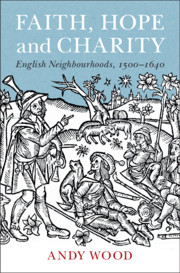‘A profound and impassioned account of what it meant to be a neighbour in an age of societal transformation. By reappraising the relationship between the idea and experience of neighbourliness, often viewed in terms of conflict or decline, Wood demonstrates vividly how perennial bonds between working people were emotionally rewarding as well as economically functional.’
Malcolm Gaskill - University of East Anglia
‘An extraordinary archival exploration into what early modern people thought and said about belonging and exclusion. Andy Wood gives voice to those who experienced the values of faith, hope and charity most sharply, through the ongoing tensions between collectivity and exclusion, in the streets and villages of early modern England; this book shows how neighbourhood was both an abstract ideal and a mode of emotional and social engagement, gendered power and social interaction.’
Laura Gowing - Kings College London
‘A deeply empathetic exploration of how the ideal of neighbourhood continued to be used to hold early modern communities together in the face of new challenges like Puritanism, and old such as hunger and disease. It is, as Wood states, a celebration of ‘voices in the archive’ as they expressed the need for togetherness.’
Craig Muldrew - University of Cambridge
‘… engrossing … Wood’s book … feels freshly relevant in showing how the values of neighbourhood were co-opted by the state … [it also testifies] movingly to the ability of ordinary people to sustain themselves, and their neighbours, even in the worst of times.’
Arnold Hunt
Source: Times Literary Supplement
'His archival terrain is bountiful. Drawing on a remarkable range of materials (from ballads, plays, court records, parish records, and a wide array of social commentary in print and manuscript) Wood provides a richly textured account of the ways in which principles of common humanity could produce and consolidate bonds across various divides shaped by belief, gender, and locality as well as social politics.'
Alexandra Shepard
Source: Family & Community History



